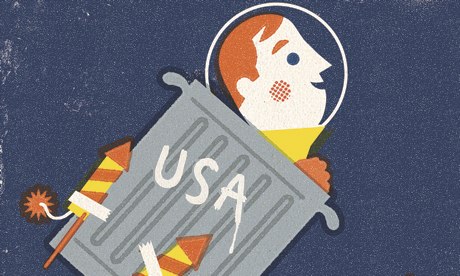
For decades, beleaguered software engineers have been reciting a well-worn mantra to their over-demanding managers: "You can have it fast, good, or cheap. Pick two." Actually, the truth embodied in that line is so ineluctable that it probably dates back, in grunt form, to the Stone Age. Whatever you're building – a new e-commerce website, a rudimentary flint spear – you need to decide. Doing it quickly and cheaply won't result in high quality; low-cost and good won't be quick; quick and high quality will cost you. This is what's known as the "triple constraint", or the "iron triangle", and history is littered with the corpses of businesspeople and politicians who foolishly thought they could ignore it. Respect it, on the other hand, and even the sky may be no limit. When JFK promised to get a man on the moon within a decade, he wisely didn't also promise to get it done cheap.
Once you start looking, triple constraints are everywhere in life, as the entrepreneur Ben Casnocha noted recently on his blog. Holidays can be exotic and/or cheap and/or relaxing, but not all three; home-cooked food can be tasty and/or nutritious and/or easy to make. (A romantic partner, Casnocha contends more provocatively, can be "hot, smart or emotionally stable: pick two.") We're rarely too troubled by double constraints, because they tend to be obvious: everybody realises you can't be a Buddhist monk while pursuing a career as a Wall Street banker, just like you can't be both single and married, or live year-round in both London and Madrid. But triple constraints are perilous, because it's easy to deceive yourself that you can beat them. Take that overused cliche about "having it all": it's tempting to imagine that, somehow, both spouses in a household could find a way to work full-time, with each spending many hours with the kids and getting all the housework done. But in reality, if you can't pay someone else to do the cleaning, maybe you'll have to settle for living in a less-than-spotless house.
All too often, we respond to such tradeoffs not by choosing, but trying to avoid choosing – and screwing ourselves up in the process. Some people strive "harder and harder, endlessly pursuing perfection in a way that undermines their feelings of satisfaction in what they do have", writes the psychoanalyst Jennifer Kunst. Others get "locked in a state of paralysis in which they can't choose a path at all, because choosing to have something means choosing to not have something else". What they don't realise, Kunst adds, is that there's liberation in seeing constraints for what they are. The false hope of a magical solution gets replaced by the exhilaration of real options: things you can truly make happen.
This thought is nowhere better expressed than in a line from Sheldon Kopp's 1972 book If You Meet The Buddha On The Road, Kill Him!, mentioned here previously: "You are free to do whatever you like. You need only face the consequences." This isn't the fake freedom of self-help, with its bogus promise that anything's possible, consequence-free. But nor is it the easy cynicism of resignation. Yes, you really can try doing that thing you've always wanted to do, or leave a job or a city or a marriage. And, yes, there'll be consequences. You can heed that fact, or get hamstrung by it. Pick one.
oliver.burkeman@theguardian.com
Follow Oliver on Twitter.

